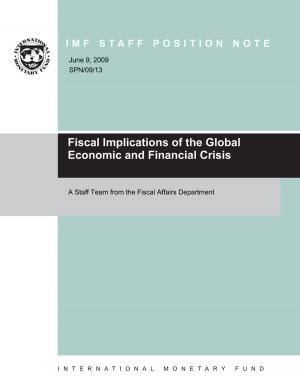Getting Energy Prices Right: From Principle to Practice
Business & Finance, Economics, Public Finance, Finance & Investing, Banks & Banking, Macroeconomics| Author: | Ian W.H. Parry, Dirk Mr. Heine, Eliza Lis, Shanjun Li | ISBN: | 9781498343107 |
| Publisher: | INTERNATIONAL MONETARY FUND | Publication: | July 22, 2014 |
| Imprint: | INTERNATIONAL MONETARY FUND | Language: | English |
| Author: | Ian W.H. Parry, Dirk Mr. Heine, Eliza Lis, Shanjun Li |
| ISBN: | 9781498343107 |
| Publisher: | INTERNATIONAL MONETARY FUND |
| Publication: | July 22, 2014 |
| Imprint: | INTERNATIONAL MONETARY FUND |
| Language: | English |
Energy taxes can produce substantial environmental and revenue benefits and are an important component of countries fiscal systems. Although the principle that these taxes should reflect global warming, air pollution, road congestion, and other adverse environmental impacts of energy use is well established, there has been little previous work providing guidance on how countries can put this principle into practice. This book develops a practical methodology, and associated tools, to show how the major environmental damages from energy can be quantified for different countries and used to design the efficient set of energy taxes. The results, which are illustrated for more than 150 countries, suggest there is pervasive mispricing of energy across developed and developing countries alike with much at stake in policy reform. At a global level, implementing efficient energy prices would reduce carbon emissions by an estimated 23 percent and fossil-fuel air pollution deaths by 63 percent, while raising revenues (badly needed for fiscal consolidation and reducing other burdensome taxes) averaging 2.6 percent of GDP.
Energy taxes can produce substantial environmental and revenue benefits and are an important component of countries fiscal systems. Although the principle that these taxes should reflect global warming, air pollution, road congestion, and other adverse environmental impacts of energy use is well established, there has been little previous work providing guidance on how countries can put this principle into practice. This book develops a practical methodology, and associated tools, to show how the major environmental damages from energy can be quantified for different countries and used to design the efficient set of energy taxes. The results, which are illustrated for more than 150 countries, suggest there is pervasive mispricing of energy across developed and developing countries alike with much at stake in policy reform. At a global level, implementing efficient energy prices would reduce carbon emissions by an estimated 23 percent and fossil-fuel air pollution deaths by 63 percent, while raising revenues (badly needed for fiscal consolidation and reducing other burdensome taxes) averaging 2.6 percent of GDP.















